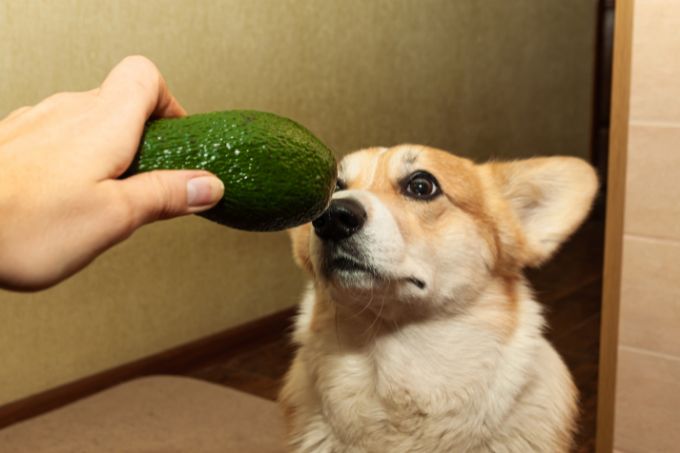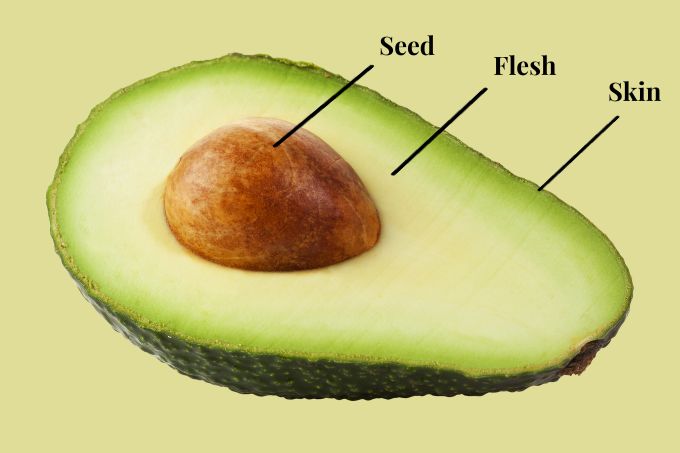This post may contain affiliate links, which means we may receive a commission from purchases made through these links. See our affiliate disclaimer.

Avocados have gained significant popularity in the past decade. Embraced for its taste & health benefits alike, it’s a much-loved breakfast snack.
If you’ve ever been tempted to slip your dog a piece of it, you’re not alone — but, can dogs eat avocado? And is avocado safe for dogs? The answers to these questions, plus the effects of avocado on dogs, we detail in the sections below.
Can dogs eat avocado?
The short answer: No, dogs should not eat avocados. They may be poisonous to dogs.
The long answer: A small amount of avocado flesh is unlikely to be toxic to your dog; the flesh of an avocado is the only safe part of the avocado to give to your dog. Note that avocado flesh still contains toxins, just in smaller amounts.

On the other hand, the skin, leaves and seeds of an avocado are all poisonous to dogs, even in small amounts. They contain larger amounts of toxins and are highly unsafe for dogs.
Our recommendation: skip the avocado altogether. There are plenty of other fruits that are safe for your dog!
Effects of avocado on dogs
Avocados are known to be healthy for humans — they contain good fats, an impressive array of vitamins, plus antioxidants & fiber. While they also impart the same nutritional benefits on dogs, there are some important caveats to consider.
Avocados contain the toxin persin
A toxin known as persin is present in all parts of the avocado fruit. Persin is harmless to humans but poisonous to many animals, including dogs.
There is no data available on exactly how much avocado or persin is poisonous to dogs. It’s likely proportional to the amount of avocado eaten, which means smaller dogs may be poisoned even by small amounts of the fruit.
The signs of avocado poisoning include stomach symptoms (vomiting, diarrhea, an upset stomach) and may progress to lethargy and/or life-threatening heart symptoms (heart attack).
Avocados contain a lot of fat
Avocados contain a lot of fat. About 75% of the calories in an avocado are from fat — a whopping 198 calories from a medium-sized avocado. And while it’s mostly healthy fats, that’s still a substantial amount of calories from a snack. Those calories can add up over time, leading to weight gain.
Dogs that regularly get fatty meals or snacks are also at risk of pancreatitis. While the exact causes of pancreatitis in dogs are unknown, it could be triggered by a high-fat diet.
What to do if your dog has eaten avocado
If you’ve given your dog a small piece of avocado flesh, keep a close eye on him for 24-48 hours for any signs of avocado poisoning. If in doubt, it would be best to seek a vet’s advice urgently.
If he has eaten an avocado unattended, i.e. you’re not sure how much avocado he’s eaten, or if he’s consumed any of the seed or skin, take him to see a vet urgently.
Again, the symptoms you’re watching out for are vomiting, diarrhea, stomach upset, and/or lethargy. However, none of these symptoms point specifically to avocado poisoning, nor are there any tests that will confirm an avocado poisoning.
Frequently asked questions
No, avocado seeds contain a high concentration of the toxin persin, which is poisonous to dogs
No, avocado seeds contain a high concentration of the toxin persin, which is poisonous to dogs. Additionally, the seed of an avocado is also rather large, and is a choking hazard for dogs.
Avocado oil does not contain the toxin persin, but still contains a high amount of fat. We advise against using avocado oil as an ingredient in any homemade food for dogs.
You may see avocado oil listed as an ingredient in commercial dog food, dog treats or even baked goods for dogs. These are safe for consumption in carefully-titrated amounts, as most commercial recipes often are.
No, guacamole contains a significant amount of avocado, and also contains onions, garlic and salt — all of which are toxic to dogs.
That brings us to the end of this feeding tip! Now that you have a lot more information about avocado safety for dogs, why not check out some of our other feeding guides?

